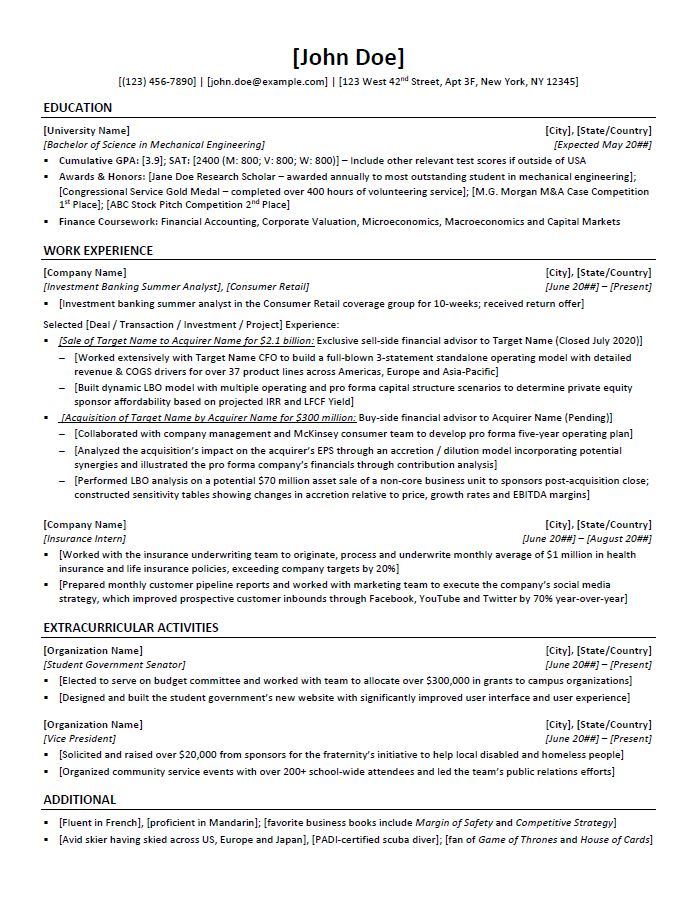Stepping into the competitive world of investment banking requires more than just sharp analytical skills and a finance degree. It demands a powerful first impression, and often, that impression comes entirely from your CV. Think of your CV not just as a document listing your experiences, but as your personal marketing brochure, designed to highlight your unique value proposition to top-tier financial institutions.
In an industry where attention to detail is paramount and competition is fierce, a generic resume simply won’t cut it. You need a document that speaks directly to the nuances of investment banking roles, showcasing your quantitative prowess, deal-making potential, and commitment. This guide will walk you through creating an exceptional CV, ensuring you stand out from the hundreds of applications and get that crucial interview.
Crafting Your Investment Banking CV: Essential Sections
Building an investment banking CV isn’t about throwing everything you’ve ever done onto a page. It’s about strategic inclusion and presentation, ensuring every word serves to strengthen your candidacy. Recruiters in this field scan resumes quickly, often dedicating mere seconds to an initial pass, so clarity, conciseness, and impactful information are absolutely vital. A strong cv template for investment banking will prioritize specific sections that directly address the skills and experiences most valued by financial firms.
The standard structure begins with your contact information, followed by education, and then moves into experience. For education, go beyond just your degree. Include your GPA, especially if it’s strong, relevant coursework like corporate finance or financial modeling, and any academic honors or scholarships. If you’ve been involved in student investment funds or finance clubs, this is the place to mention it, highlighting any leadership roles or significant projects.
Your work experience section is where you truly shine. This isn’t just a chronological list of jobs. For each role, think about achievements, not just responsibilities. Quantify everything you can. Did you help secure a deal worth X million dollars? Did you improve a process that saved the company Y percent in costs? Use action verbs that resonate with the finance world – analyzed, modeled, projected, executed, negotiated, structured. Even if your experience isn’t directly in banking, draw parallels to show transferable skills.

Finally, consider sections for skills and interests. For skills, think technical proficiencies like Excel, Bloomberg Terminal, financial modeling software, and any programming languages. Languages are also a big plus. Interests can show personality and dedication, but keep them professional and concise. Avoid anything controversial. This comprehensive approach ensures that every facet of your professional profile contributes to a compelling narrative for recruiters.
Key Sections to Include
- Contact Information: Make it easy for them to reach you.
- Education: GPA, relevant coursework, honors, academic projects.
- Work Experience: Quantify achievements, use strong action verbs.
- Skills: Technical software, languages, certifications.
- Leadership and Extracurricular Activities: Show initiative and teamwork.
Optimizing Your CV for Maximum Impact
Once you have the core sections laid out, the real work begins: optimizing every line to resonate with investment banking recruiters. This involves not just what you say, but how you say it. Tailoring your CV to each specific role is crucial. While a general template provides a strong foundation, customizing it for different firms or specific divisions (M&A, ECM, DCM, etc.) demonstrates genuine interest and a keen understanding of their needs. Read job descriptions carefully and mirror their language where appropriate, ensuring you hit key buzzwords that might be picked up by Applicant Tracking Systems (ATS).
Focus on conciseness and clarity. Investment bankers are busy people; they appreciate direct, impactful communication. Avoid jargon unless it’s industry-standard and universally understood. Use bullet points effectively to break down information, making it easy to scan and digest. Each bullet point should start with a strong action verb and highlight a quantifiable achievement or significant responsibility. Remember, quality over quantity. A powerful one-page CV is far more effective than a rambling two-pager.
Proofreading is non-negotiable. A single typo or grammatical error can be enough for a recruiter to dismiss your application. It signals a lack of attention to detail, a fatal flaw in investment banking. Read your CV multiple times, use spell-checkers, and, ideally, have a trusted friend or mentor review it. Pay close attention to formatting consistency: uniform font, spacing, and bullet point style throughout the document give a professional impression.
Finally, consider how your CV tells a story. Every experience and skill should build towards showcasing you as a future investment banking professional. Even seemingly unrelated experiences can be framed to highlight transferable skills like problem-solving, analytical thinking, teamwork, or client management. Think about the narrative you want to convey: ambitious, analytical, results-driven, and a quick learner. Your CV is your opportunity to pre-sell yourself before you even step into an interview room.
Tips for Maximizing Impact
- Tailor your CV to each specific job description.
- Quantify achievements with numbers and percentages.
- Use strong, industry-relevant action verbs.
- Keep it concise, ideally one page for entry-level.
- Proofread meticulously for any errors.
- Maintain consistent and professional formatting.
Ultimately, your CV is your ticket to the interview stage, the critical first step in securing a role in investment banking. It’s a testament to your capabilities, your dedication, and your potential to contribute significantly to a demanding yet rewarding field. Investing time and effort into crafting a document that is precise, impactful, and perfectly tailored to the industry’s expectations will undoubtedly set you apart.
By following these guidelines and thinking strategically about how you present your experiences and skills, you’ll create a powerful CV that not only meets but exceeds the high standards of investment banking recruitment. Your journey into finance starts with this crucial document, so make sure it opens doors rather than closes them.
